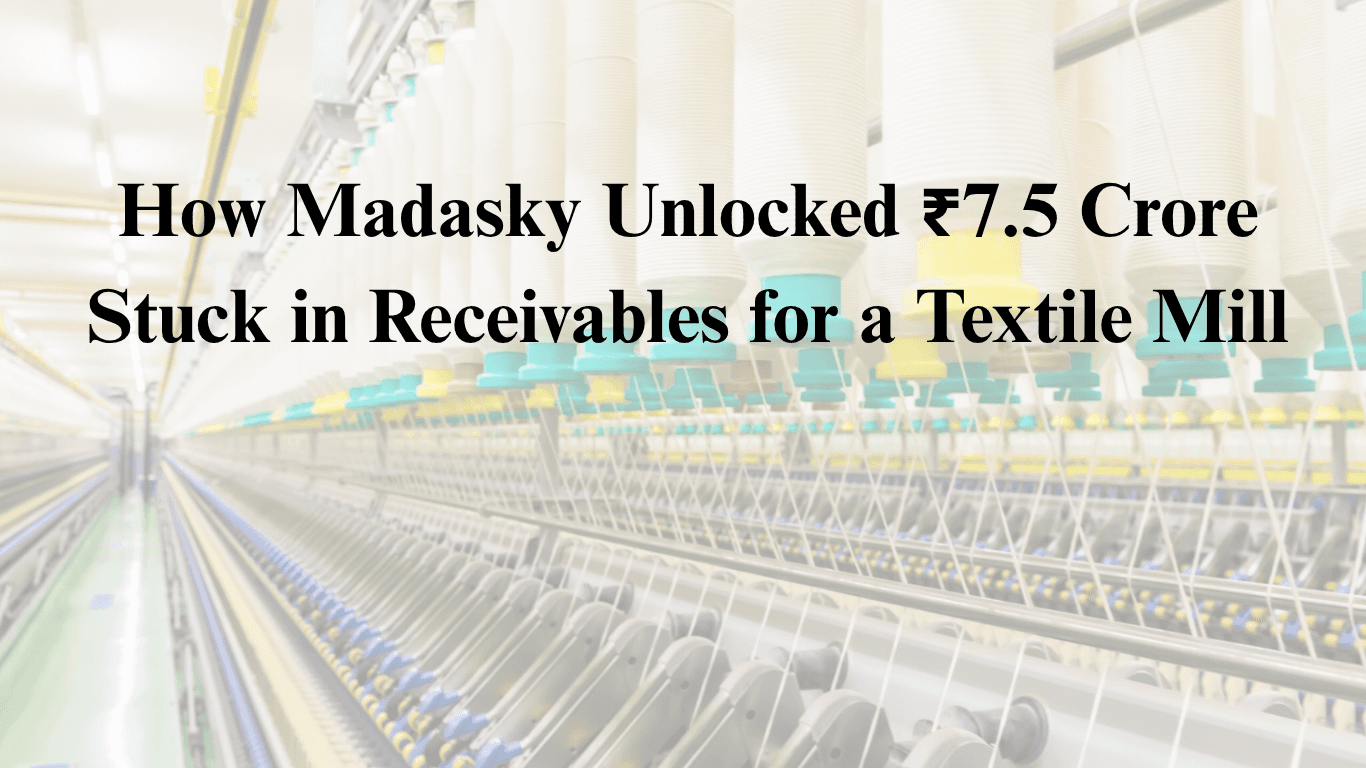


A prominent textile mill, respected for its woven and value-added fabrics, had been operating successfully for over two decades. Revenue continued to grow, and customer acquisition stayed strong. Yet, beneath this positive performance, a serious financial issue was brewing. Nearly ₹7.5 crore in payments had remained stuck across multiple buyers—a problem that went beyond normal credit cycles.
As liquidity dried up, the ripple effects intensified. Suppliers demanded upfront advances. Procurement slowed. Production schedules slipped. Customer trust eroded.
What began as a receivables issue soon became a strategic and operational bottleneck threatening business stability. The company’s management decided to partner with Madasky to recover blocked funds and rebuild the systems that would safeguard financial discipline long-term.
The Core Objective
Madasky set two clear and pragmatic objectives:
The solution needed to be practical, business-first, and aligned with the company’s innovation-driven identity.
Madasky’s Intervention
A multi-layered approach that addressed the root causes of stuck money, not just the symptoms.
Step 1. Intellectual Property Governance
Clearing disputes at the source.
A deep audit revealed that a major reason behind delayed payments was unclear intellectual property (IP) ownership. Several fabric designs and technology applications were innovative, but insufficient documentation made it difficult to defend their originality when clients questioned it.
Madasky’s IP team implemented a structured clean-up plan:
By establishing clear proof of ownership, Madasky eliminated buyer excuses for delayed payments and restored confidence in product authenticity. The company shifted its posture — from defending designs to asserting ownership backed by verifiable documentation.
Step 2. Go-To-Market and Licensing Model
Turning innovation into enforceable commercial value.
The textile mill had powerful designs and technologies but lacked a business model that could enforce payment discipline. Madasky built a commercial framework around the mill’s innovations.
Key initiatives included:
With the new GTM structure in place, late payment risks sharply declined. Buyers respected a relationship that combined value, structure, and accountability.
Step 3. Brand Positioning to Influence Buyer Behavior
When buyers trust more, they pay faster.
Madasky observed that brand perception subtly influenced the speed of payments. Buyers had started doubting claims of innovation due to limited brand presence. To change that narrative, Madasky led a complete brand revitalization.
Actions included:
The outcome was immediate. The same buyers who delayed payments began accelerating settlements to preserve a renewed business relationship with a credible, respected brand.
Brand clarity translated directly into faster collections.
Step 4. Carbon Credit and Sustainability Compliance
New leverage. New monetization potential. The mill had already invested in eco-friendly manufacturing but never capitalized on it. Madasky recognized this as both a marketing advantage and a financial opportunity.
The consulting team executed a roadmap to align sustainability practices with carbon credit eligibility:
This not only added a new revenue stream but also boosted credibility in payment negotiations, as buyers valued the mill’s proven environmental responsibility.
Results in 6 Months (24 weeks)
Direct business impact backed by structured execution.
| Performance Indicator | Outcome |
| Receivable recovery | ₹7.5 crore successfully unlocked |
| Cash position | Working capital normalized for procurement and production |
| Future cash flow | New royalty-based model created recurring, traceable income |
| Sales conversion | Strengthened due to improved trust and brand credibility |
| Sustainability edge | Unlocked access to green contracts and incentive-linked deals |
Collections turned into cash in bank, not overdue reminders.
Strategic Impact on the Client
Beyond immediate recovery, the engagement fundamentally transformed how the mill approached commerce.
The company shifted from a reactive operations mindset to a proactive commercialization mindset.
It now protects what it creates.
It monetizes what it owns.
It collects what it earns.
Conclusion
Blocked receivables are rarely a finance problem—they are a strategy problem in disguise. Madasky addressed the core issues behind the client’s ₹7.5 crore blockage — aligning IP, commercial structure, market positioning, and sustainability compliance into an integrated, resilient framework. Today, the mill stands stronger, enjoying renewed liquidity, brand confidence, and sustainable growth — a true example of how strategic discipline converts trust and innovation into cash flow and competitiveness.